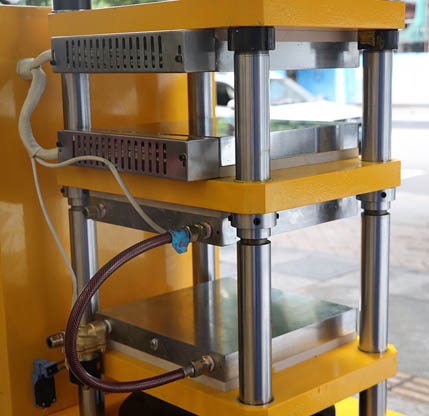To test and process rubber and polymer material, a laboratory vulcanizer press machine is an essential tool used to produce high-quality, small-scale rubber sheets or samples for research, testing, and quality control.
Laboratory small flat vulcanizing machine is also known as hot press forming press machine. It is mainly used for sample preparation of vulcanised rubber and plastic.
Vulcanization is a critical process in the rubber industry that enhances the mechanical properties and durability of rubber materials ,Through heating and applying pressure in the vulcanization press , a cross-linked structure is formed between rubber molecules, therefore the elasticity, strength, wear resistance and durability are enhancd to a much greater degree without warping or becoming deformed for rubber silicone materials. stretched .
The lab vulcanizer press machine is specially used for formula design of rubber ,silicone and plastic matieral,heat and pressure vulcanization treatment of rubber.
How Does a Laboratory Vulcanizer Press Work?
A laboratory vulcanizer press machine operates by applying heat and pressure to uncured rubber or polymer compounds. The vulcanization process typically involves the following steps:
1. Preheating the Plates – The upper and lower plates of the lab vulcanizer press machine are heated to a specified temperature.
2. Placing the Rubber Sample – The raw rubber material is placed in the casting mold and clamped between the electric-heating flat plates to apply pressure and temperature,which make the material shaping,testing and serving as the basis for the ingredient of mass production.
3. Applying Pressure – Hydraulic or pneumatic force is applied to compress the material uniformly.
4. Curing/Vulcanization – During this process under heat and pressure( usually between 140 °C and 160 °C (284 °F–320 °F)), the rubber material will undergo a chemical reaction to form a stable cross-linked network, thereby obtaining the desired physical and chemical properties.
5. Cooling & Demolding – After the curing cycle, the sample is cooled down and removed for further testing or use.
Main Features of a Laboratory Vulcanizer Press
* Precise Temperature & Pressure Control – Ensures accurate and repeatable test conditions.
* Compact Design – Suitable for research labs, universities, and quality control departments.
* Digital Display & Programmable Settings – Modern machines come with PLC controls for easy operation.
* Durable Heating Plates – Typically made of high-grade steel for uniform heat distribution.
* Cooling System – Some models include a water or air cooling system to accelerate sample preparation.
Wide Applications of a Laboratory Vulcanizer Press
Our laboratory vulcanizer press machine are widely used in many industries ,including:
* Rubber & Tire Industry – For testing rubber compounds before mass production.
* Plastic & Polymer Research – Evaluating thermoplastic and thermosetting materials.
* Adhesive & Coating Development – Ensuring proper bonding and durability.
* Material Science & Academia – Supporting research in polymer chemistry and engineering.
Why Use a Laboratory Vulcanizer Press?
Using a vulcanizer press machine allows researchers and manufacturers to:
✔ Develop new rubber formulations.
✔ Conduct quality assurance tests.
✔ Improve production efficiency.
✔ Reduce material waste in R&D processes.
If you are looking for a high-quality laboratory vulcanizer press, Simptek Machine offers advanced models tailored to your research and manufacturing needs. We offer and manufacture a wide range of vulcanizer ,including manual lab vulcanizer press and automatic vulcanizer press machine ,they are available in 10TON,30TON,50TON,60TON,80TON,100TON,300 ton etc .
Contact us today to learn more!







